Teach me how to fish and I will transform my life – and my community
IFAD Asset Request Portlet
Asset Publisher
Teach me how to fish and I will transform my life – and my community
21 April 2020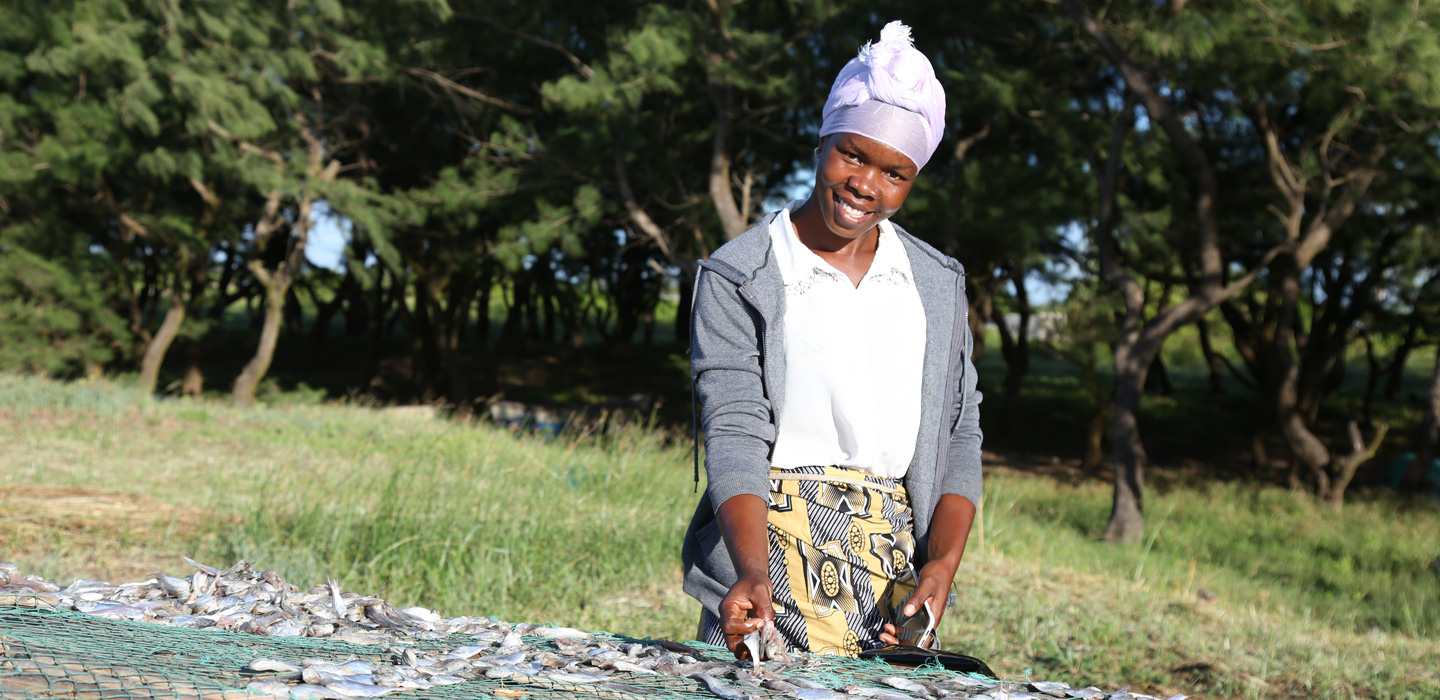
Along the coastline of Mozambique, fishing boats dot the clear blue waters. For the people on these boats, their daily excursions are their livelihood – in more ways than one. Fish are both their main source of food and their main source of income.
Until recently, many Mozambicans were unable to fish at more than a subsistence level. With little to nothing left over to sell, they often felt trapped in a cycle of meagre incomes, at the whims of a changing climate.
But all that is changing.
From 2010 to 2019, IFAD and the Government of Mozambique implemented the ProPESCA project to improve the livelihoods of fishers and their communities living along Mozambique’s coastline. Operating within a framework of cooperation, the project has brought together people from neighbouring regions and nations to teach and learn from each other – with impressive results.
In Zambezia Province, for example, production levels of fish increased from 35,000 tons in 2012 to 80,000 tons in 2018. Zambezia Province is also where we met Mariamo Fermino, one of ProPESCA’s beneficiaries.
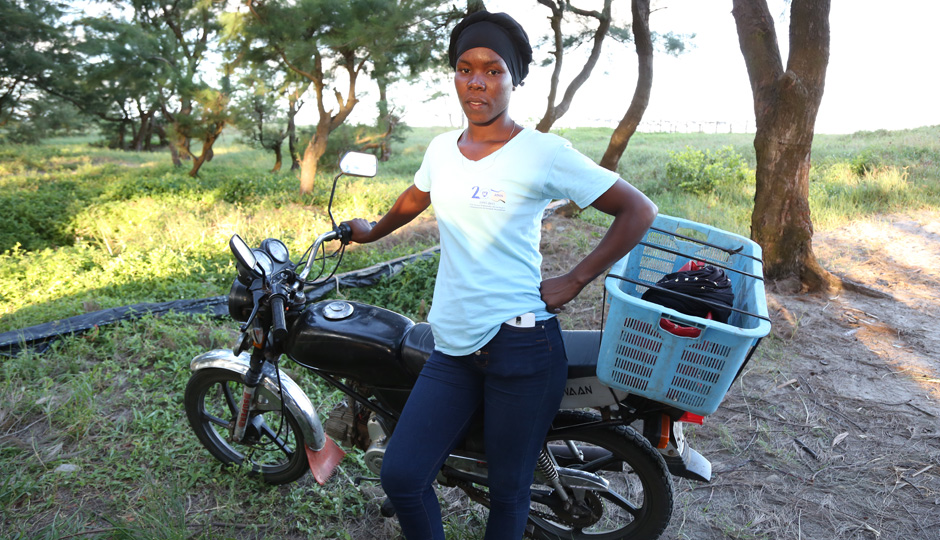 |
| Mariamo pauses for a picture with her motorbike. Photo credit IFAD/David Paqui |
Mariamo, now aged 28, was born in Zambezia’s Pebane District. After her father’s death left her mother unable to pay her school fees, she was unable to finish her studies – but she didn’t let that stop her. In 2010, she started making tea and cooking food to sell in her village. Yet eventually, she was unable to sustain her business, and she and her husband Ramadan knew they would have to look for opportunities – and financial stability – elsewhere.
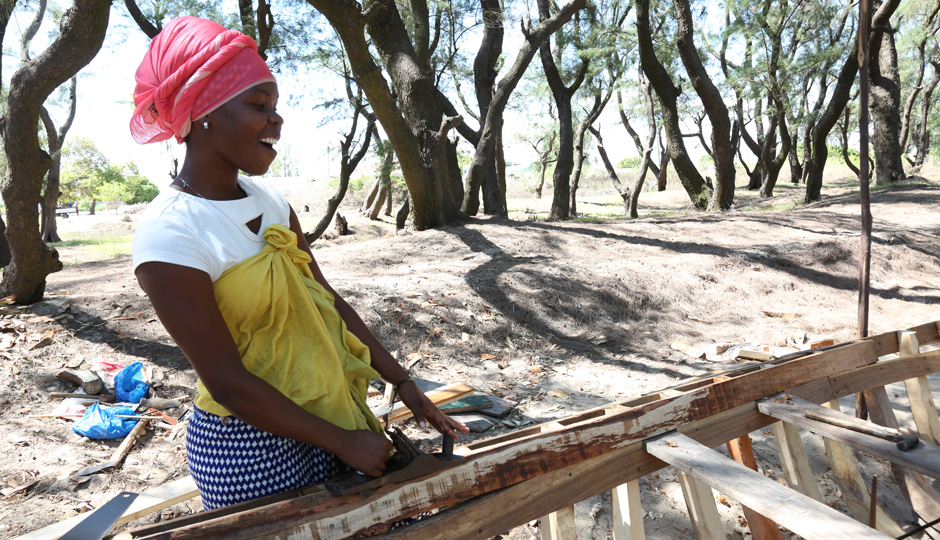 |
| Mariamo at work on the beach. Photo credit IFAD/David Paqui |
In 2015, Mariamo and Ramadan moved to Zalala First Village. Neither of them had any family or friends there, and they had only 1,500 metical (about US$22) between them. But they had heard that the community was benefiting from a fisheries project that created business opportunities.
She started by baking and selling cakes in the village and on the beach. She used her earnings to start buying, salting and selling fish – and that qualified her to join ProPESCA.
Through the project, she received training in hygiene and nutrition, in cooking, baking and salting fish, and in marketing and savings. The business skills she gained from this training allowed her to start diversifying and expanding her business.
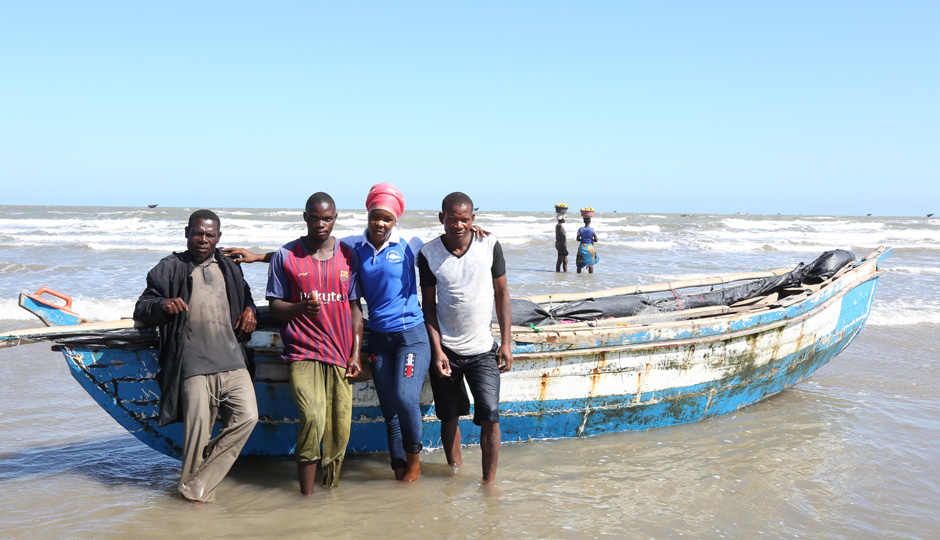 |
| Mariamo with her fishing boat and three of her employees. Photo credit IFAD/David Paqui |
Her earnings grew. She started dreaming big. She wanted to buy her own fishing boat. The she joined the Zalala First Village women’s savings group and saved until she was able to buy one.
Today, she employs six fishermen. They go fishing every day on rotation.
Mariamo’s business, like many in Mozambique, is also facing the effects of a changing climate. As time goes by, the volumes of fish in each catch are decreasing, and the Government of Mozambique has begun to regulate the types of nets that can be used during the off-season. Thanks to her involvement with ProPESCA, Mariamo was able to invest in approved nets so that she can send her boat out year-round and continue to earn.
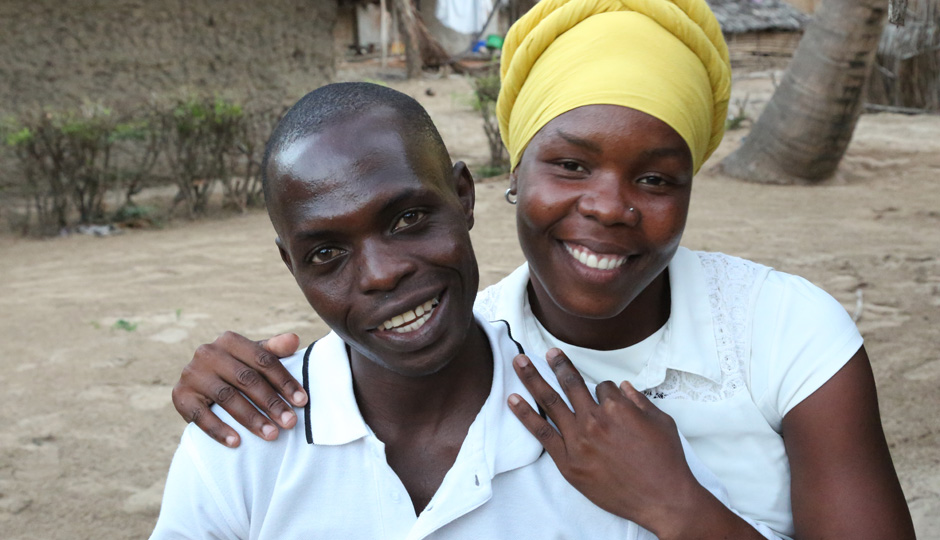 |
| Portrait of Mariamo and Ramadan. Photo credit IFAD/David Paqui |
Mariamo has saved a lot from her business. She is now paying Ramadan’s tuition so that he can become a primary school teacher. She's also keeping her younger sister in high school in the city of Quelimane, where she is paying for her room rental, meals and school fees. “I was so sorry not to be able to go to school myself. If I have a child one day, I will do the best I can to send my child to school and put him or her through university,” says Mariamo.
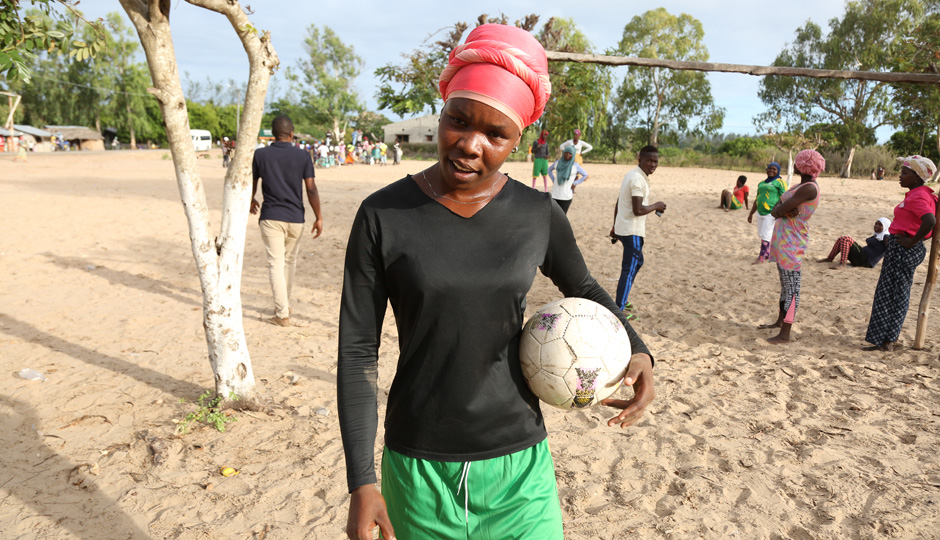 |
| Mariamo gets ready to play soccer with her teammates. Photo credit IFAD/David Paqui |
Mariamo is a role model in Zalala First Village. She is a true leader and a promoter of gender equality in her community. She even managed to bring together the young women of this conservative community to form a women’s soccer team. They play every Saturday afternoon.
“I want the women of my community to follow my example. That’s why I do my best to help them, so they don’t have to wait for their husbands to buy food or send their children to school or to hospital when they are sick,” she said.
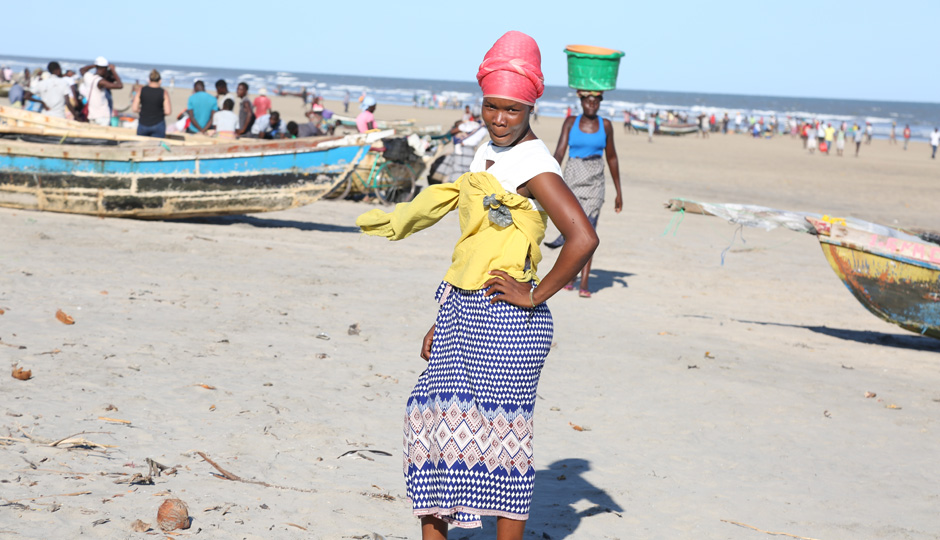 |
| Mariamo poses on the beach. Photo credit IFAD/David Paqui |
Mariamo has a clear long-term plan. Within the next 10 years, she wants to buy up to five more boats, all with engines for open-sea fishing, and employ more men, particularly young men. She also wants to buy a small van so that she can take her to fish to the markets in Quelimane and Nampula, where they would fetch a better price.
“ProPESCA didn’t give me fish – it taught me how to fish. It empowered me. Today, I can afford more than three nutritious meals a day. I can send my husband and my sister to school and give my mother money when she needs it,” adds Mariamo. “I want the project to continue forever so that many women can benefit from it and be empowered. Thank you to IFAD and the Government of Mozambique. I like ProPESCA a lot.”
And Mariamo isn’t alone. Thanks to ProPESCA, many women and young people across the coastal provinces of Mozambique have similar stories to tell.
Update, September 2020
Nearly a year has passed since we first interviewed Mariamo Fermino Bilasse. Lately, given the spread of the COVID-19 pandemic and its effects on countless people and businesses, we’ve been checking in on participants in IFAD-supported projects around the world. Recently, we caught up with Mariamo to ask how she and her business have been doing.
Although COVID-19 itself hasn’t yet come to Zalala First Village, it’s already had drastic effects on the local economy. Public access to the beach has been restricted for a long time now, and commuting is still prohibited. The number of sellers coming to buy fish – and therefore the volume of fish sales – has drastically diminished. Mariamo’s income has thus taken a significant hit. It comes at an especially bad time: she was already in need of new fishing nets, as the ones she’s currently using are only suited to catching small fish with low market value. Meanwhile, although some of the restrictions have recently been lifted, the timing isn’t optimal either: September, with its winds so strong that sometimes the boats can’t even leave shore, has never been the best month for fishing.
Yet, despite these circumstances, life in Zalala First Village goes on. Even though the beach is closed to public access, fishermen are still allowed to work. Mariamo’s employees still go out on the water nearly every day. She’s also started up some of her old income streams again, selling fish cakes on the beach. Thanks to the money she’d saved up before the pandemic, she was able to invest in a freezer – so she now makes and sells ice, too.
Ramadan helped out with the business as well, during the months when schools were closed and he was unable to attend his teacher training course. Recently, though, they’ve reopened and he’s been able to resume his studies. He still plans to become a teacher.
Mariamo’s ambitions haven’t flagged either. She’s encouraged by the income she’s still able to bring in and by the resilient community she’s a part of. She still has hope in the future, and her dream of someday owning five boats is alive and well.
Discover Mariamo’s story in virtual reality
Learn more about IFAD’s work in Mozambique.